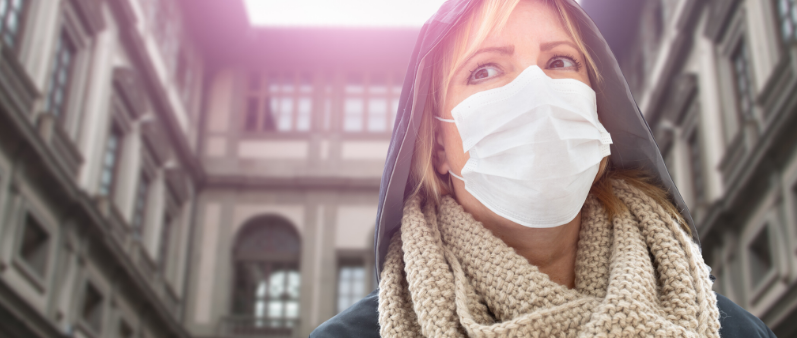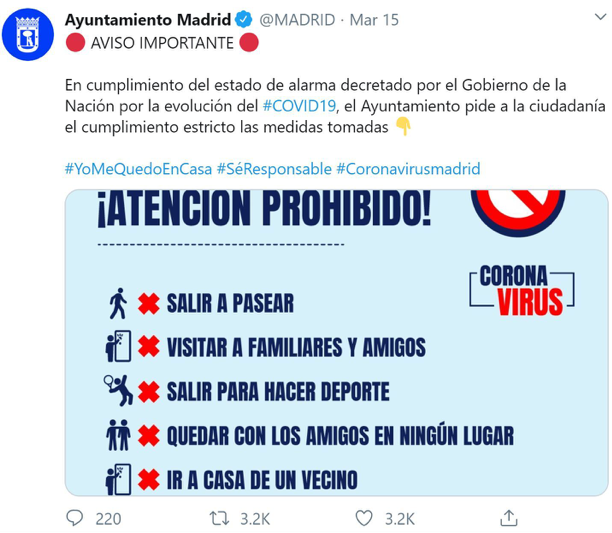
Madrid, recently considered the epicenter of the Covid-19 pandemic, in one of the world’s hardest-hit countries, has been in a draconian citywide lockdown since March 14th. The lockdown guidelines required that the city’s 6.6 million residents remain confined to their homes. Only vitally essential trips to the grocery, pharmacy, or hospital are allowed. Non-essential workers must work from home.

Tweet from @Madrid with lockdown rules
A city known for its nightlife, tourism, and culture soon became a visual of empty streets, parks, and shuttered businesses. The people of Madrid are now forced to adjust to a different type of life. From the outside, it is hard to know what it really is like under the strict city-wide quarantine.
University student Sandra, High school teacher, Marcus, and actress, Paloma, join us to share their daily experience during the Madrid coronavirus lockdown.
How are you quarantining?
Marcus: I am quarantining with my wife and my dog.
Paloma: I am in Madrid in my flat. In the first days of the quarantine, I was thinking about going back home with my parents, who are not in Madrid but in a town an hour ½ away from here. I decided to stay here because they are older, and it was risky for them to be in touch with someone that had been living in Madrid. At that point, Madrid had been the main focus of the infection.
Sandra: I am in my house with my family and my dogs. I am pretty lucky in a sense because I don’t live in the center, I live on the outside, I have a backyard and I have two dogs, so it is not that bad for me. It doesn’t always feel like I am in quarantine you know? But I miss going out and seeing my friends.
What does your day look like in lockdown?
Marcus: I wake up at 8:00, take a shower and have some breakfast. From 9:00 to 13:30 I work online with my students, I do a lot of paperwork, and prepare online classes. At 13:30 I walk my dog and then I have lunch. Sometimes after lunch, I nap and then I read, watch a film or play some games on my mobile. Lately, I have been preparing many things at home for my future baby who is coming really soon, and also call family and friends via video call. At 20:00 I walk my dog again, and then I have dinner and watch TV for a while.
Paloma: Online lessons for my students, videos for my students, and the school where I work, and I have been preparing art projects. Basically, I cook amazing things that I didn’t know I was able to cook, do some sports, make video calls with my students, watch TV and clean. Do you know who Marie Kondo is? I Marie Kondo’ed the whole house, I threw out a lot of things I didn’t need. That is basically my routine.
Sandra: I wake up at 7:30, walk my dog and 9:00 (at the latest) I start studying until lunch, and after lunch, I continue studying until dinner.
How do you get your information on the status or changes of the lockdown?
Marcus: First, at work and then mainly on TV.
Paloma: I am not a TV person so during the lockdown I’ve been mostly informed about the situation by social media, friends, family, and… memes! Which I love and I have been consuming a lot of. In a more serious way, mostly with the internet, the news, and online newspapers.
Sandra: I get my information by watching the news.
What is the most difficult part of the lockdown?
Marcus: The hardest part for me is not to be allowed to go out of my house whenever I want, to be outside the amount of time I want, and to travel to my hometown to be with my family.
Sandra: Probably not going out, not making plans with my friends…like to go out to dinner, going out for a drink, going to my grandma’s house, going to see my family. Right now being quarantined is when you most appreciate what you had in the past. The plans you had, everything.
Paloma: The hardest part is the loneliness I think. I really miss my people and I really miss my friends and my family. Loneliness [is not the only hardest part], but also not having my regular life. Not going outside, and not be able to see the sun, have a beer with my friends, run or ride my bike, and not meeting people which I love because I’m a very social person.
I will really say the hardest part is hearing the news about losing people you love. I lost someone I loved because of this disease and it was one of the hardest moments because you hear every day about the virus and you put no face onto it, but once you put a face onto it, it becomes even harder.
What are you hopeful about?
Marcus: I am hopeful about the future. I think we as a country have overcome many hard times, and this situation is going to improve with time and effort.
Paloma: I am hopeful about how this is going to somehow be good for the environment or how this is going to change us as a society. And I enjoy this time of self-discovery.
What are you most nervous about after the lockdown ends?
Marcus: I worry about social contact a lot. I think that when lockdown ends, we all will be respecting social distancing for a long period of time, and I don’t like the idea of not having people close to me.
Paloma: The thing that makes me the most nervous is not knowing what will happen in my future as a professional. I had a very good year planned for 2020. I had a lot of things to do in the theatre and in that spectrum. This was going to be one amazing year in my career as an actress, and all of this was canceled. So now I’m nervous about my future in a professional way, and also about how normal life is going to be now because I have a feeling that normal life is not going to be so normal at least this year.
Sandra: The fact that the government isn’t controlling the situation, a lot of people are against how they are dealing with it. And also probably the fact that when this is all over, everyone will go out at the same time, and it’s most likely that in the fall there will be a second wave.
But for Paloma, along with the anxiety, there is a sense of community.
Paloma: I’ve seen so many people doing things together, feeling solidarity. Here in Spain, everyone goes out at 8 pm to applaud for the doctors and people working in the hospitals because it’s really important for us. It’s a public (health) system and everybody is doing a great job. So the people who are locked in our homes are going out every single day to applaud, and this is creating a new perspective of collectivity in the neighborhoods.
Final thoughts
Fortunately for the residents, after 50 long days, the tough coronavirus restrictions are finally starting to ease. Spain announced a multi-step plan to ease out of lockdown. Recently, children and families were allowed back outside for a designated playtime. This week everyone else is allowed outside for walks and exercise.
Yet, we know that this is going to be a drastic event that will change the course of history. The ripples of this pandemic are causing us to adapt and develop a resilience in ways none of us expected. We also know that Spain has historically faced a lot of adversity, and Spain has no plans to waver.
Hopefully one day we can all have the opportunity to travel, and continue learning about the unity and culture of Madrid. For now, we must be patient.
No Comments for "News From Spain: A Day in Madrid’s City-wide Lockdown"